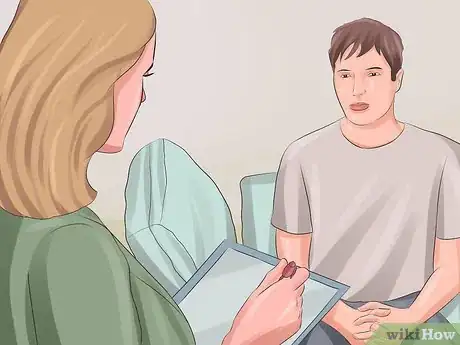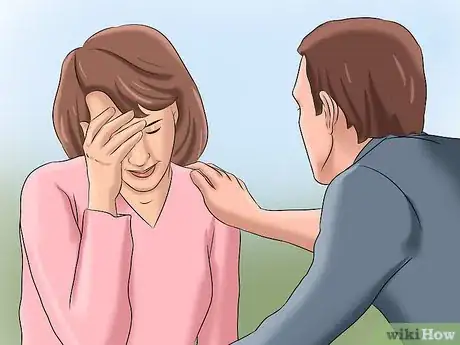This article was co-authored by Trudi Griffin, LPC, MS. Trudi Griffin is a Licensed Professional Counselor in Wisconsin specializing in Addictions and Mental Health. She provides therapy to people who struggle with addictions, mental health, and trauma in community health settings and private practice. She received her MS in Clinical Mental Health Counseling from Marquette University in 2011.
There are 18 references cited in this article, which can be found at the bottom of the page.
This article has been viewed 10,708 times.
Sexual disorders can happen to men or women at any age. Sometimes there are underlying medical or emotional problems. Regardless of the reason for your sexual disorder, you should talk openly and honestly with your partner so he or she can help you overcome the problem and regain your sex life.
Steps
Gathering Information Before Talking to Your Partner
-
1Go see a doctor. If you are having sexual problems, you may want to go see a doctor. Many sexual disorders have an underlying medical cause. If you know the reason why you have a sexual disorder, you can bring this to your partner's attention.[1]
- Your doctor may perform a physical exam or additional tests to determine the underlying problem. Your doctor may also send you to a specialist or give you a referral to a sex therapist who can help you determine any causes for your sexual problems.[2]
- For example, diabetes can lead to sexual problems in both males and females.
- You may want to ask your doctor for suggestions on how to work on the sexual problems at home.
-
2Determine your specific sexual disorder. There are various different sexual disorders that people can have. These disorders also vary depending on your gender. Men and women face different sexual problems which may specifically deal with their genitalia, or may have a mental or psychological disorder that affects the normal function of their sexual organs. Being able to tell your partner what your problem is can help you both figure out a way to deal with it.[3]
- Erectile dysfunction is a common sexual disorder for men. Men who have erectile dysfunction have trouble getting and maintaining erections.[4] Men may also face premature, delayed, or inhibited ejaculation. Men can also face a low libido, leading to less interest in sex.[5]
- Women can face desire disorders (where they may not be interested in or have less desire for sex), arousal disorders (where they don't feel arousal), orgasmic disorders (where they have trouble having orgasms or feel pain during an orgasm), or sexual pain disorders, where they feel pain during or after sexual intercourse.[6]
- Aging and hormonal changes, including a reduction in estrogen in women and testosterone in men, can lead to sexual problems.[7] Menopause in women can cause sexual problems, such as lack of lubrication.[8]
- Stress, anxiety, and depression can lead to sexual disorders.
- Sex addiction is another sexual disorder.[9]
-
3Write down your thoughts. One good way to prepare for talking to your partner about your sexual disorder is to write down your thoughts. When you get face-to-face with your partner, you may get embarrassed, frustrated, or upset, which may interfere with your thoughts. Prepare ahead of time so you know what you want to say.[10]
- You can write down your thoughts onto a piece of paper you have with you when you talk to your partner. You may want to write out complete sentences or just list bullet points with ideas so you are reminded of points you wanted to make.
- You may want to practice out loud what you want to say so it's easier for you when you get in front of your partner.
-
4Think about how your partner may feel because of your behavior. Because you know you have a sexual disorder, you may have been pulling away from your partner or have stopped wanting to have have sex. This may lead your partner confused and hurt. Before you talk to your partner, think about how your actions may have been perceived so you can think about ways to approach or reassure your partner.
- Your partner may feel pushed aside, confused, and hurt because he or she doesn't believe you feel attracted to him or her anymore.
- Your partner may have become self-conscious because he or she believes there is something wrong with his or her body that has caused you to stop being interested.
- Be prepared for your partner to think that you may be having an affair. Don't get defensive, but be prepared to face the accusations.
-
5Educate yourself. You should do as much research about the sexual disorder as possible. Your partner may have a lot of questions or be unfamiliar with your problem. You should be able to provide your partner with information to help him or her understand what you are going through.[11]
- You may want to compile a list of websites or books for your partner to consult so he or she can better understand what you are going through.
Discussing Your Sexual Disorder with Your Partner
-
1Choose the right time and place. Where you decide to talk to your partner about your sexual disorder is important. You should probably refrain from discussing it in the bedroom because that is the place for intimacy and sex. Instead, talk about it on the couch so you both can be comfortable.[12]
- Pick a time when you both have an open schedule so you can discuss the topic for as long as needed. You may need to tell your partner, “I have something very important to discuss with you. I would like to know a good time very soon where we can talk uninterrupted.”[13]
- If you have children, see if you can get a grandparent or friend to watch them while you discuss this. You want the focus to be on your relationship, and you don't want to be distracted.
-
2Be honest with your partner. You owe it to both yourself and your partner to be honest with him or her about your sexual disorder. Pretending everything is okay and faking orgasms or pleasure will only cause problems down the road. Opening up the lines of communication with your partner helps start to build intimacy between the two of you, which can help your sexual problems.[14]
- The sooner you are honest with your partner, the better. Your partner may be upset with you if you have been lying or pretending for years. You may have to explain why you didn't share your problem with him or her, which brings up trust issues.
-
3Use language you are comfortable with. Talking about sexual problems can be really embarrassing and cause guilt, shame, and feelings of self-doubt. When you talk to your partner, use phrases or words that make you comfortable. Tell your partner that you feel embarrassed and this is hard for you. Tell your partner you are uncomfortable. This helps you start to address your discomfort and to let your partner know he or she may need to be understanding and supportive.[15]
- For example, you may say, “This is really embarrassing. I'm having sexual problems, and I'm not sure how to tell you” or “This is uncomfortable for me. My sexual problems are causing me physical discomfort while trying to figure out how to talk about this is causing me emotional discomfort.”
- You may also want to figure out what words you want to use to refer to your genitalia. You may may want to use the medical terms, like vagina or penis, or you may feel more comfortable using slang terms. Use whichever terms make you feel comfortable discussing it.
-
4Explain your disorder to your partner. More than likely, your partner will be unfamiliar with your sexual disorder. You need to explain it in as much detail as you can to help your partner understand. You may thinks the name of the disorder is obvious, but your partner may be confused about what that means or how it affects you specifically.
- If your partner is a different gender, you may need to explain carefully and in detail your sexual problems. For example, if you have erectile dysfunction, your female partner may not understand how you are unable to get an erection. If you have a female lubrication problem, your male partner may not understand what that means and why that causes pain.
- If you have a partner of the same gender, you will probably still need to explain how your body is reacting and what is happening to you. A man who has never faced ED may not understand your experience, and a woman who has no problem with lubrication may be confused about what is happening to you. Don't assume your partner will understand just because he or she has the same genitalia as you.
- Don't be embarrassed. Remember, most sexual disorders are manageable, especially with open communication with your partner.
-
5Reassure your partner. Make sure to tell your partner that it is not an issue with him or her, but you. Tell your partner that you still find him or her attractive and desirable and that you do not want anyone else. Emphasize that you still love your partner very much. Your partner may start blaming himself or herself for the sexual problem, so you need to make sure he or she understands that he or she is not the source.[16]
- Tell your partner that you came to him or her because you love him or her, that you want to regain the sex life you both used to have, and you want his or her help with this problem.
-
6Admit to your partner that you need him or her. Sexual disorders can be difficult problems to face. They may leave you feeling like less of a man or woman, less desirable, or with lower self-worth. You may feel anxiety or depression due to the sexual disorder. Share this with your partner and tell him or her that you need to know that he or she is on your side and still loves you.[17]
- Knowing that your partner supports you and will help you overcome your sexual disorder can be a tremendous help. Many times, sexual disorders can be addressed in the bedroom with understanding and attentive partners who are willing to provide the physical and emotional support needed to address and fight the sexual disorder.
-
7Refrain from equating love and sex as the same thing. Make sure to separate love and sex for both you and your partner. Just because you are having sexual problems doesn't mean you don't still love one another. Some people equate sexual frustration or the inability of his or her partner to perform sexually with a failure on his or her part. Make sure you separate love and sex when you discuss this with your partner.[18]
- Remind your partner that it is not his or her fault. Neither of you are at fault. Seventy percent of couples face sexual problems at some point in their relationship. Holding on to the love you feel for each other as you address the sexual issues can help you successfully overcome the sexual disorder.
-
8Discuss medical treatment options. You should tell your partner about medical treatment options for your sexual disorder. This includes medication and any other treatments you can get from a doctor or psychiatrist. Ask your partner to support you as you undergo medical treatments.[19]
- Treatment for an underlying mental condition, like anxiety or depression, may be required. A psychiatrist may prescribe antidepressants or anti-anxiety medication.[20]
- A doctor may prescribe hormone shots, pills, or creams if the disorder is caused by a hormone deficiency.[21]
- Your doctor may medically treat an underlying medical condition, such as diabetes or a thyroid condition. This may include medication.
- Women with sexual disorders can take medicine, such as flibanserin, which is supposed to help combat low sexual desire. Women can also undergo estrogen or androgen therapy to help with low libidos or arousal disorders.[22]
- If you have erectile dysfunction, doctors often prescribe medications like Avanafil, Sildenafil, Tadalafil, and Vardenafil.[23]
- For premature ejaculation, there is a spray called Promescent that can be used to help reduce sensitivity. Some doctors may prescribe SSRIs, such as Zoloft or Paxil.[24]
- Your doctor may also suggest aids, such as vacuums, penile implants, or dilators.[25]
Addressing the Sexual Disorder
-
1Focus on intimacy. Sometimes, taking a break from sex can be a good way to address your sexual disorder. Instead of worrying about sex, you and your partner can focus on emotional intimacy. Many sexual disorders occur because of various emotions or stressors that end up affecting the couple's sex life. Focusing on the relationship can help you strengthen your connection, which can lead to improved sex.[26]
- For example, you may want to go for walks together, go to dinner, or do other activities. You may want to spend an entire evening talking to one another.
- You also may want to spend time touching in non-sexual ways, such as holding hands, holding one another, and kissing for the sake of kissing.
-
2Work on any relationship problems. You may have relationship problems because of the sexual disorder. You and your partner may have had some misunderstandings because of your actions, and you may have developed trust issues. There may be outside stressors that are affecting your relationship. You should work on these issues with your partner to move your relationship past this small bump in the road.[27]
- Clearing up relationship problems can help lead the way to improved sex. Removing miscommunication, anxieties, and any underlying anger or feelings of resentment can make it easier to feel closer and intimate with your partner.
-
3Try going to therapy together. You may decide to go see a sex therapist or couples counselor. Going to see a therapist or counselor doesn't mean that something is wrong with your relationship. Sexual disorders can cause a strain on both partners and the relationship. A sex therapist may help you learn how to build intimacy and work on techniques to address the disorder, while a couples counselor may be able to help you work through any relationship issues that have arisen due to the disorder.[28]
- If your partner suggests going to counseling, don't get angry. See it as a way your partner is trying to support you and work on your relationship. Don't get discouraged if you want to go to counseling but your partner doesn't.
- You can search the internet for certified sex therapists and couples counselors in your area. You may also talk to your doctor or specialists about a referral.
-
4Spend time experiencing foreplay. One way you can help boost your sexual function is to spend more time focusing on foreplay instead of heading straight for intercourse. Foreplay helps both partners enjoy the experience more. Foreplay can help a woman feel aroused and help a man get an erection.[29]
- Foreplay includes a lot of different things. Take time to explore each other's bodies and focus on your partner's pleasure. Don't rush towards orgasm. Slow down the sexual experience, which can help you overcome your sexual disorder.
- During foreplay, you may want to use your hands and your mouth. Try touching different parts of the body, not just the penis or vagina. Make the foreplay experience an emotionally intimate experience as well as a physical one.
- Lack of stimulation before intercourse can lead to problems such as a reduced level of arousal, inability to get or hold an erection, lack of lubrication, and inability to reach orgasm. Some people may need some sort of stimulation for up to an hour before they are ready for intercourse.
-
5Bring extra products into the bedroom. Due to your sexual disorder, you and your partner may need some extra help. That's fine. For women who have trouble with lubrication or painful sex, consider using lubricants or vaginal creams to help with dryness.[30]
- Use toys to help enhance your sexual experience. Sexual toys may help increase stimulation during foreplay. You can use vibrating toys to stimulate the clitoris to help with female arousal problems, while the vibration may help a man get and maintain an erection.
- You may also want to try an erotic video or erotic literature. Watch the video together or read the literature to each other to help increase your physical and emotional intimacy.[31]
-
6Tell your partner what you like or need. Some people have never been open or honest about what they like during sex. Take this time to tell your partner what you like or don't like during sex. Talk about things you'd like to try and experiment with. Try to be as specific as possible for your partner. Consider showing your partner what you like, or walking him or her through what to do for you. [32]
- Men who experience erectile problems or women who have trouble getting aroused may need more manual stimulation than his or her partner. Tell your partner that you need this so he or she knows how to help you during sex.[33]
- Remember to keep your words focused on your and not your partner. Don't accuse your partner of not satisfying you. Instead, say things like, “I really like when you touch my hair” or “My breasts are really sensitive. I would like you to touch them more.”
-
7Experiment during sex. Sometimes, couples get in a rut. They just do the same thing, and that doesn't lead to arousal or desire anymore. If this is the case for you and your partner, try experimenting. You may want to try different positions, participate in role play, or share fantasies that you both can act out.[34]
- For women who experience pain during sex, trying new positions may help make intercourse a more pleasurable experience. For example, try being on top so you can control the movement and position.
- When talking about role play or fantasies, make sure to remember that each partner may not feel comfortable with everything. You want to try new things your partner wants to try, but don't feel bad if there are things your partner suggests that you are not willing to do. Find a compromise on both sides where you both willingly engage in situations and fantasies your partner wants to try while still being comfortable.
References
- ↑ https://my.clevelandclinic.org/health/diseases/9121-sexual-dysfunction
- ↑ http://familydoctor.org/familydoctor/en/diseases-conditions/sexual-dysfunction-women.printerview.all.html
- ↑ https://my.clevelandclinic.org/health/diseases/9121-sexual-dysfunction
- ↑ http://www.mayoclinic.org/diseases-conditions/erectile-dysfunction/basics/definition/con-20034244
- ↑ https://my.clevelandclinic.org/health/diseases_conditions/hic_An_Overview_of_Sexual_Dysfunction/hic_Sexual_Dysfunction_in_Males
- ↑ http://familydoctor.org/familydoctor/en/diseases-conditions/sexual-dysfunction-women.printerview.all.html
- ↑ http://www.acog.org/Patients/FAQs/Your-Sexual-Health
- ↑ http://www.helpguide.org/harvard/tips-to-improve-your-sex-life.htm
- ↑ http://psychcentral.com/lib/faqs-for-partners-of-sex-addicts/
- ↑ https://www.urmc.rochester.edu/encyclopedia/content.aspx?ContentID=4552&ContentTypeID=1
- ↑ https://my.clevelandclinic.org/health/diseases/9121-sexual-dysfunction
- ↑ https://www.webmd.com/erectile-dysfunction/features/getting-intimate-talking-together-about-ed#1
- ↑ http://www.helpguide.org/harvard/tips-to-improve-your-sex-life.htm
- ↑ http://www.helpguide.org/harvard/tips-to-improve-your-sex-life.htm
- ↑ http://www.mayoclinic.org/diseases-conditions/erectile-dysfunction/basics/definition/con-20034244
- ↑ https://familydoctor.org/condition/sexual-dysfunction/
- ↑ https://familydoctor.org/condition/sexual-dysfunction/
- ↑ http://www.helpguide.org/harvard/tips-to-improve-your-sex-life.htm
- ↑ https://my.clevelandclinic.org/health/diseases/9121-sexual-dysfunction/management-and-treatment
- ↑ http://www.apa.org/topics/sex/treatment.aspx
- ↑ https://my.clevelandclinic.org/health/diseases_conditions/hic_An_Overview_of_Sexual_Dysfunction
- ↑ http://www.mayoclinic.org/diseases-conditions/female-sexual-dysfunction/basics/treatment/con-20027721
- ↑ https://www.mayoclinic.org/diseases-conditions/premature-ejaculation/diagnosis-treatment/drc-20354905
- ↑ https://www.mayoclinic.org/diseases-conditions/premature-ejaculation/diagnosis-treatment/drc-20354905
- ↑ https://my.clevelandclinic.org/health/diseases_conditions/hic_An_Overview_of_Sexual_Dysfunction
- ↑ http://www.mayoclinic.org/diseases-conditions/erectile-dysfunction/basics/definition/con-20034244
- ↑ http://www.acog.org/Patients/FAQs/Your-Sexual-Health
- ↑ https://www.apa.org/topics/sex/treatment
- ↑ http://www.acog.org/Patients/FAQs/Your-Sexual-Health
- ↑ http://familydoctor.org/familydoctor/en/diseases-conditions/sexual-dysfunction-women.printerview.all.html
- ↑ http://www.aafp.org/afp/2000/0701/p141.html
- ↑ http://www.helpguide.org/harvard/tips-to-improve-your-sex-life.htm
- ↑ http://www.joslin.org/info/sexual_dysfunction_talking_it_over.html
- ↑ http://www.aafp.org/afp/2000/0701/p141.html




-Step-20.webp)
-Step-21.webp)












-Step-23.webp)





























































Medical Disclaimer
The content of this article is not intended to be a substitute for professional medical advice, examination, diagnosis, or treatment. You should always contact your doctor or other qualified healthcare professional before starting, changing, or stopping any kind of health treatment.
Read More...